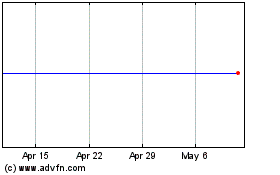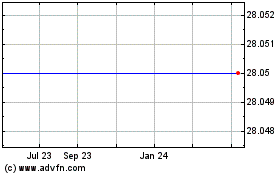Philadelphia City Council Approves Sweetened Beverage Tax--Update
June 16 2016 - 4:01PM
Dow Jones News
By Mike Esterl
The Philadelphia City Council approved Thursday a special tax of
1.5 cents per ounce on sweetened beverages, the first large U.S.
city to pass such a measure.
The wide-ranging tax will include regular sodas, diet sodas,
sports drinks, energy drinks and other nonalcoholic beverages with
added sweeteners. It will be levied on distributors and could raise
prices by 25% to 30% if passed along fully to consumers.
It represents a major blow to soft-drink giants Coca-Cola Co.,
PepsiCo Inc. and Dr Pepper Snapple Group Inc. The beverage industry
argues such taxes are discriminatory and has spent more than $100
million since 2009 to defeat similar initiatives in more than two
dozen cities and states.
The planned tax is slated to go into effect in January and is
higher than the penny-per-ounce levy on sugary drinks in Berkeley,
Calif., which in 2014 became the first U.S. city to pass such a
measure. It's also broader than the Berkeley ordinance, which
exempted drinks with noncaloric sweeteners.
The American Beverage Association, which represents major
beverage companies, hasn't ruled out challenging the Philadelphia
tax in court. It argues the country's fifth-largest city is
overstepping its taxation authority.
A large coalition in Philadelphia including retailers,
restaurants and the International Brotherhood of Teamsters also has
opposed the tax, warning grocery bills would soar, jeopardizing
thousands of jobs and hitting the poor the hardest.
Other parts of the country are eyeing similar measures,
including Oakland, whose city council voted last month to put a
penny-per-ounce tax for sugar-added beverages on the November
ballot. Residents in San Francisco and Boulder, Colo., also could
vote on a tax this fall.
The initiatives coincide with efforts by public-health officials
to curb rising obesity and diabetes rates. The Food and Drug
Administration recommends that Americans limit their daily intake
of added sugars to about 12 teaspoons or 200 calories -- less than
in a 20-ounce bottle of Coke or Pepsi.
Economists have estimated beverages have a price elasticity of
about 1, meaning a 25% to 30% increase in prices could cut
consumption by a similar percentage. In Mexico, though, soda sales
have been rebounding after initially falling in 2014, when a
roughly 10% sugary-drink tax was introduced.
U.S. soda consumption has been declining even without special
taxes. Volumes fell 1.2% in 2015, the 11th straight yearly decline,
according to industry tracker Beverage Digest. Diet soda sales are
falling more sharply as Americans avoid zero-calorie, artificial
sweeteners such as aspartame.
Philadelphia Mayor Jim Kenney steered clear of health arguments
in proposing a sweetened-drink tax. Instead, he pushed the tax as
an easy way to fund prekindergarten and other city services.
Mr. Kenney, who took office in January, initially proposed a tax
of 3 cents per ounce. The city council amended the proposal last
week, cutting the tax rate in half but expanding it to include
drinks with diet sweeteners.
The American Beverage Association says the tax on distributors
is effectively a sales tax requiring the state legislature's
approval. It also says the tax violates the "uniformity clause" in
Pennsylvania's constitution requiring uniform taxes across the
state.
Mr. Kenney's administration has said it expects the tax to be
upheld if challenged in court.
The city estimates the sweetened-beverage tax will generate $91
million in annual revenue after being fully implemented and that it
will collect $409.5 million over the next five fiscal years.
A spokeswoman for Mr. Kenney said $210 million will be earmarked
for 6,500 pre-K seats and $39 million will be spent on 25 community
schools over five years. Another $49 million will go toward
servicing the debt to improve parks, recreation centers and
libraries.
In addition, $24 million of tax revenue is earmarked for the
city's general fund and $65.6 million for other expenditures,
including retrials for juveniles, added during final negotiations
with council members.
About 59% of Philadelphians backed the initial 3-cent-per-ounce
sugary-drink proposal in a poll published last month by Temple
University and co-sponsored by the city's health department.
A poll earlier this month by David Binder Research funded by the
American Beverage Association found only 38% of Philadelphia
residents supported a 3-cent-per-ounce tax.
Write to Mike Esterl at mike.esterl@wsj.com
(END) Dow Jones Newswires
June 16, 2016 15:46 ET (19:46 GMT)
Copyright (c) 2016 Dow Jones & Company, Inc.
Keurig Dr Pepper (NYSE:KDP)
Historical Stock Chart
From Mar 2024 to Apr 2024

Keurig Dr Pepper (NYSE:KDP)
Historical Stock Chart
From Apr 2023 to Apr 2024
